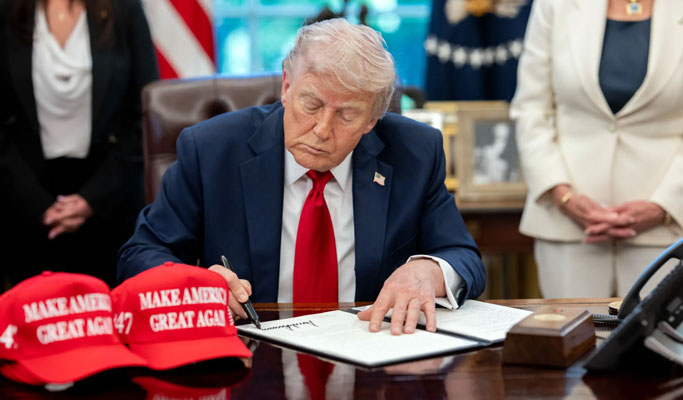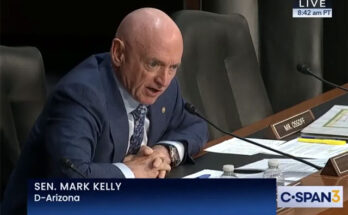WASHINGTON – The University of Arizona on Monday rejected an offer of preferential funding in exchange for embracing the Trump administration’s political agenda – though in a more conciliatory way than some universities.
“We seek no special treatment and believe in our ability to compete for federally funded research strictly on merit,” UA President Suresh Garimella wrote to Secretary of Education Linda McMahon, emphasizing that “we have much common ground with the ideas your administration is advancing on changes that would benefit American higher education and our nation at large.”
That brought to seven the number of universities that have rejected the proposed “Compact for Academic Excellence in Higher Education,” sent Oct. 1 to UA and eight other universities.
On Friday, White House officials spoke with three other universities: Arizona State University, Washington University in St. Louis, and the University of Kansas.
The compact offered preferential access to federal benefits, implicitly threatening that noncompliance would curtail access to contracts, research grants, student financial aid, and visas.
In exchange for special treatment, universities would commit to not considering race, ethnicity, or sex in admissions or hiring. They would also have to freeze tuition for five years, use only “biological definitions of gender,” cap international enrollment at 15% and conduct annual surveys to ensure compliance.
The Massachusetts Institute of Technology was the first to reject the proposal, followed by Brown University, the University of Southern California, Dartmouth College, the University of Pennsylvania, and the University of Virginia.
MIT President Sally Kornbluth called the terms “inconsistent with our core belief that scientific funding should be based on scientific merit alone” in an Oct. 10 letter to McMahon.
Brown asserted that agreeing to “the Compact – in any form – fundamentally would not” align with its core values.
Dartmouth’s response was also more pointed than UA’s: “I do not believe that the involvement of the government through a compact – whether it is a Republican- or Democratic-led White House – is the right way to focus America’s leading colleges and universities on their teaching and research mission,” wrote President Sian Leah Beilock. “Our universities have a responsibility to set our own academic and institutional policies, guided by our mission and values, our commitment to free expression, and our obligations under the law.”
UA’s most recent annual budget includes $320 million in federal funds – about a tenth of the budget.
As of Monday evening, Vanderbilt University and the University of Texas at Austin had yet to announce whether they had accepted or rejected the compact publicly.
The Education Department had given the initial nine universities until Monday afternoon to submit feedback on the compact, and until Nov. 21 to accept or reject it.
ASU and the others who spoke with White House aides on Friday have not been formally asked to sign yet.
“ASU has long been a voice for change in higher education, and as President Trump’s team seeks new and innovative approaches to serve the needs of the country,” the university said in a statement. “ASU has engaged in dialogue and offered ideas about how to do so.”
Like UA, ASU is governed by the Arizona Board of Regents. ABOR chair Doug Goodyear, noting that “the federal government is the system’s largest single funder,” said the board supports UA’s response.
“The board is committed to protecting the values of Arizona higher education that have made it the best in the world –- most importantly academic freedom, institutional independence and merit-based research. And that remains our focus,” he said in a statement.
The federal government holds significant leverage over research universities, though the Trump administration’s pressure campaign is unprecedented.
In July, UA alone lost almost $60 million in federal grants, the school reported.
Administrators also face pressure from faculty who have spoken out against the compact and the Trump administration’s tactics.
Some UA faculty, students, and staff demonstrated on campus last week.
“This is going to fall on all our students, staff, and faculty, without any of the supposed benefits,” said Marcos Esparza, acting president of United Campus Workers Arizona, which represents employees at the state’s public universities. “If we sign this agreement, there’s going to be a crackdown on free speech and academic freedom at the university leadership level.”
Esparza said many faculty already feel constrained by changing federal priorities, including funding cuts. Many are concerned that the Trump policies will affect what and how they can teach.
Lars Fogelin, who has taught anthropology for more than 15 years at UA, said the proposed education compact would make research and teaching on gender studies, climate change, public health, and other topics “unworkable.”
“Am I supposed to now change my classes to fit with the administration’s version of reality? That just is as close to literally government censorship,” he said.
Garimella discussed the issue on Friday with the Arizona Board of Regents during an executive session that was closed to the public.
“A federal research funding system based on anything other than merit would weaken the world’s preeminent engine for innovation, advancement of technology, and solutions to many of our nation’s most profound challenges,” he wrote Monday to the education secretary. “We at the University of Arizona, with strong concurrence and support from the Arizona Board of Regents, our governing body, share your vision of continuing to strengthen our higher education system for the betterment of the country – a vision rooted in a merit-based pursuit of excellence that directly or indirectly benefits all Americans.”
UA relies on federal funds for research on topics ranging from agriculture to public health.
Lynn Pasquerella, president of the American Association of Colleges and Universities, called the proposal a “weaponization” of federal funding.
“There are elements that I think every leader in higher education would agree with – affordability and accountability,” she said by phone. “But as framed now, it would involve unprecedented intrusion into nearly every aspect of college and university operations, from admissions to the curriculum, in ways that infringe upon academic freedom, institutional autonomy, and shared governance.”
Pasquerella added that a mandatory tuition freeze would constrain universities’ ability to serve lower-income and underrepresented students.
“One of our most significant strengths is a diversity of the student population, and the capacity to learn from others different from oneself,” she said. “The grand challenges and wicked problems of the future are going to involve working across borders with diverse teams. It would do a disservice to higher education.”










